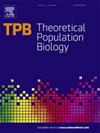通过垫脚石分散的重定向帮助的进化。
IF 1.3
4区 生物学
Q4 ECOLOGY
引用次数: 0
摘要
个体孵化失败的原因有很多,比如捕食蛋。一些物种采取了一种策略来补偿由于繁殖失败而造成的适应性损失。在一些鸟类物种中,经历孵卵失败的个体可以帮助有亲缘关系的邻居照顾它们的后代。这种行为被称为重定向帮助,它通过提高整体适应性来补偿适应性的损失。然而,与重定向帮助相关的包容性健康收益在“粘性”种群中被抵消,在“粘性”种群中,个体保持靠近其出生地,近亲之间的竞争加剧。在之前的模型中,我们通过建立一个缺乏明确空间结构并强调全球范围内分散的无限岛模型,研究了种群粘度如何影响重定向帮助的进化。在这里,我们用一个空间明确的踏脚石分散模型重新审视种群粘度在重定向帮助进化中的作用。这个新框架下的扩散模式比无限岛情况下的更受约束,加强了我们感兴趣的种群粘性。与之前的研究相反,我们发现局部分散可以阻止重定向帮助的进化,甚至在某些特定情况下导致恶意行为的进化。我们的预测对扩散的规模、存活率和帮助所带来的好处很敏感。我们讨论了我们的发现,关于以前的文献调查进化的帮助在粘性人口。本文章由计算机程序翻译,如有差异,请以英文原文为准。
Evolution of redirected help with stepping-stone dispersal
Individuals can be subject to brood failure for many reasons, e.g. egg predation. Some species have adopted a strategy to compensate for fitness loss due to brood failure. In some bird species, individuals that experience brood failure can help a related neighbor care for their offspring. This behavior is known as redirected helping and it compensates for the loss of fitness by improving inclusive fitness. However, inclusive fitness gains associated with redirected helping are counteracted in a ‘viscous’ population, where individuals remain close to their natal site, by increased competition among kin. In a previous model, we investigated how population viscosity affects the evolution of redirected help by building an infinite-island model that lacked explicit spatial structure and emphasized dispersal on a global scale. Here, we revisit the role of population viscosity in the evolution of redirected help with a spatially explicit stepping-stone dispersal model. The dispersal pattern in this new framework is much more constrained than in the infinite-island case, strengthening the population viscosity we are interested in. In contrast to previous work, we find that localized dispersal can prevent the evolution of redirected help and even lead to the evolution of spiteful behavior in some specific cases. Our predictions are sensitive to the scale of dispersal, survival rate and the benefits provided by helping. We discuss our findings with regard to the previous literature investigating the evolution of helping in a viscous population.
求助全文
通过发布文献求助,成功后即可免费获取论文全文。
去求助
来源期刊

Theoretical Population Biology
生物-进化生物学
CiteScore
2.50
自引率
14.30%
发文量
43
审稿时长
6-12 weeks
期刊介绍:
An interdisciplinary journal, Theoretical Population Biology presents articles on theoretical aspects of the biology of populations, particularly in the areas of demography, ecology, epidemiology, evolution, and genetics. Emphasis is on the development of mathematical theory and models that enhance the understanding of biological phenomena.
Articles highlight the motivation and significance of the work for advancing progress in biology, relying on a substantial mathematical effort to obtain biological insight. The journal also presents empirical results and computational and statistical methods directly impinging on theoretical problems in population biology.
 求助内容:
求助内容: 应助结果提醒方式:
应助结果提醒方式:


